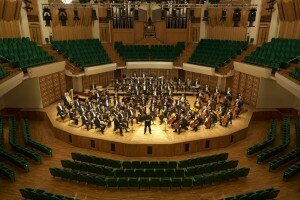
HK Cultural Centre Concert Hall © HK Phil
With the maturation of recording and streaming technologies, it is now possible to listen to the best of classical music in the comfort of our own places. This tremendous change, from having to dress up decently for “physical” concerts to being able to enjoy classical music online, indeed makes classical music more affordable and accessible. Yet, when you ask non-classical music lovers why they are not fond of classical music, you’ll still get these answers: “it’s too obscure; I can’t understand it”, “I don’t know music theory”. Although the tunes of the most popular classical music are widely known, the idea that classical music is elitist is generally deep-rooted. However, does it really take an intellectual to appreciate the beauty of classical music? (A short answer would be: NO, by looking at the author of this article.)
It is probably true that learning music theory helps one understand a composition better, particularly for modern classical music. Romantic classical music, as its name implies, is known for its expressiveness and I believe the emotional response provoked is – like knee-jerk reflex – something innate and not acquired through learning. I guess you won’t want me to go deep into the neuroscience behind, so I will illustrate this by several examples.
Spend a quiet night listening to this heartbreakingly beautiful piece of music by Russian composer Rachmaninoff. (Even a pair of inexpensive earphones will do.)
Sergei Rachmaninoff: Symphony No.2 – 3rd movement: Adagio
There is a strong sense of nostalgia and longing throughout the piece and the music would dig up some past memories from your mind, no matter fond ones or not. The intense yearning in the music contains endless reminiscences, evoking an inner eruption of emotions – some may say affection, some may say despair… Our interpretations of music are of course affected by our personalities and personal experiences, but I am pretty convinced that we all feel “something” from the music. Is it necessary for us to analyse its instrumentation, use of harmonies and form in order to be engaged in the music?
After something rather emotionally intense, let us switch to a more tranquil composition by Denis Bédard.
Denis Bédard: Lamento from Suite pour orgue
The warm sound from the organ, with its simple melody, immediately brings so much peace and calmness, taking us away from the troubles in reality and conjuring up a complex combination of emotions: a mixture of sorrow and optimism, like a gleam of hope in the midst of darkness.
For those who say classical music is boring, this piece is a must-listen.
Rossini: William Tell Overture – Finale
The energetic vibe and rhythmic vitality of this piece makes it a perfect solution to post-weekend fatigue. It is hard not to stamp your feet when listening to such an exhilarating piece of music!
There is inevitably some repertoire in classical music that requires some more musical knowledge to really comprehend and appreciate it (especially contemporary ones). Still, classical music is definitely not something just for knowledgeable people. Leonard Bernstein once said, “Music can name the unnameable and communicate the unknowable.” Hackneyed though it may sound, classical music has the ability to communicate inexplicable feelings and enrich our lives in many different ways.
So, if you are a classical music enthusiast, please share this with your non-classical music lover friends. If you are a non-classical music lover, please take some time to listen to the music and hopefully you will be convinced.
